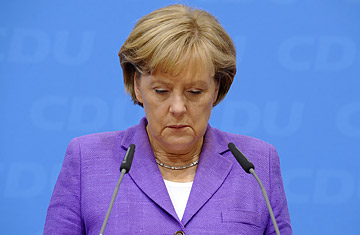
German Chancellor Angela Merkel addresses a press conference in Berlin on Aug. 31, 2009
There is a new normal in Germany, and it's eerily familiar.
No, it's not a return to the Weimar Republic, although those who happened to catch the political postmortems on German television on Super Sunday — the day of state elections in Saxony, Thuringia and Saar — may have found themselves experiencing a sense of déjà vu. Even the public TV journalist seemed at a loss as he sheepishly attempted to find common ground between the motley collection of candidates during his election wrap-up. On the far right of the podium was a neo-Nazi, joined by a Communist and Social Democrat in the middle, then a probusiness liberal, an environmentalist Green and, not lacking in irony, a conservative Christian Democrat all the way to the left. It was a political free-for-all. With so many smaller parties entering state governments and Germany's federal election just weeks away, the country's main political players now face the possibility that the stable two-party coalition they were hoping for will no longer be an option.
While Germany was divided, the communists had their own country; in the West, they were outlawed. Official doctrine in East Germany declared the neo-Nazis nonexistent. In West Germany, far-right candidates seldom gained enough traction to clear the 5% hurdle in any state election to enter parliament. And when they did, they usually imploded shortly after taking their seats and always failed to get re-elected to a follow-on term.
Now, 20 years after the fall of the Berlin Wall, East and West Germans are becoming more similar in their political preferences. Parties that used to be typical West German parties, such as the Greens and the liberal Free Democratic Party (FDP), now have significant support in the former East. And Die Linke, an amalgam of the former East German ruling Communist Party and disgruntled Social Democrats, is gaining ground among left-leaning voters in the former West. Voters who were once loyal to a single party have become swing voters, with the main parties taking the hit. The ruling Christian Democratic Union (CDU) is losing support to the FDP because voters feel the CDU has lost its probusiness edge. Meanwhile, the CDU's coalition partner, the Social Democratic Party (SPD), has lost support to Die Linke because many left-wing SPD members feel the party has moved too far to the right.
The result is a fragmentation of the vote that will make it more difficult to form the kinds of stable coalitions that Germany has gotten so used to of late. Sunday's elections demonstrate the trend at the state level, with potential coalitions — such as a government of Social Democrats, Die Linke and the Greens or one linking the CDU, the FDP and the Greens — being considered. But the states also tend to operate as political laboratories for the federal government, and any new coalition combinations will be closely watched as potential models in the aftermath of the federal election on Sept. 27.
Now German politics is no longer dominated by the two big parties — the Christian Democrats and the Social Democrats — with the kind of stable two-party coalitions that were typical of West Germany. The political game is much more open, with at least five parties vying for power and reflecting the much broader spectrum of political opinion in the population. This seemingly unstable coalition system is the new normal. "The trend for the future is a stabilization of instability," says Ulrich von Alemann, a political scientist at the University of Düsseldorf.
According to opinion polls, Chancellor Angela Merkel seemed to be coasting to victory in September — but now the race seems more uncertain than ever. Her CDU party lost its absolute majority in Thuringia and Saar and may lose power altogether to three-party left-leaning coalitions in those states. In Saxony, the CDU and FDP govern together and were re-elected — but for the first time in a German state parliament, a neo-Nazi party, the NPD, kept its seats.
In 2005, the fragmentation of the federal vote forced Merkel into a rare coalition with her political rivals, the SPD. Polls show that in September she has a chance to dump the SPD in favor of a center-right coalition with the FDP — an outcome that, before Sunday, seemed almost a sure thing. But not anymore. "The lesson for Merkel from Sunday is clear: A coalition at the federal level only with the FDP is anything but assured," wrote the conservative daily Die Welt after the state elections.
As Germany's political landscape grows less divided along old Cold War lines, the power of the smaller parties is increasing, and that, the left-leaning daily Tageszeitung noted on Monday, could make it impossible for Merkel's CDU and FDP to gain a majority in September. "The only thing that is certain is that nothing is certain," the paper wrote. "Now it is clear that we have a five-party system, which in the end could result in a return of the Grand Coalition [between the CDU and SPD]."
It could be that the only way for Merkel to avoid a repeat of the Grand Coalition is to enter a three-way coalition with the FDP and the Greens. But "the federal parties are not yet ready to go down that road," says Alemann. In the end, they may not have a choice.
